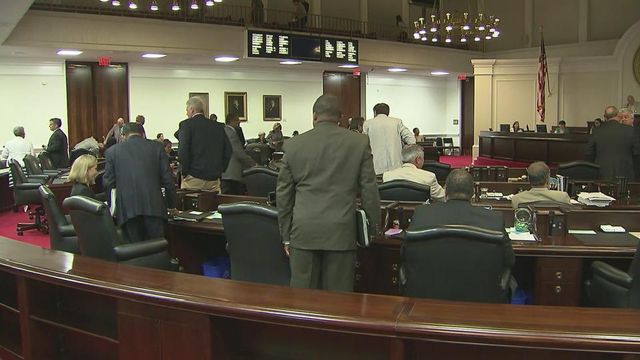Tax redistribution scheme gets first Senate OK
An economic development package that would change how sales tax is distributed won tentative approval in the Senate Monday night, but not without fireworks as rural senators accused their urban counterparts of greed.
Posted — UpdatedThe Senate proposal, a rewrite of House Bill 117, would extend the Job Development Investment Grant program for three more years, increasing the funding for the program from $15 million to $20 million a year, but changing the formulas to make it more favorable to rural areas. It also includes expanded tax breaks for aviation fuel, data center equipment and power.
The Senate plan changes the state's corporate tax formula to "single sales factor," a revision that will cost the state more than $70 million a year when fully phased in, but which will make the state more competitive with South Carolina and Georgia, two states that have recently won major developments North Carolina had pursued. It also includes a large-project provision that would boost incentives for projects that would invest $500 million and create at least 1,750 jobs.
However, the bill includes a controversial provision that would change the way the state distributes local sales tax revenue. Under current law, the 2 percent local tax that the state collects is sent back to counties on a 75/25 ratio: 75 percent stays in the county where it was collected, and 25 percent is distributed to counties statewide on a per-capita basis.
That formula was implemented in 2007 as part of what's known as the "Medicaid swap." The state took over the counties' share of Medicaid payments in exchange for an additional half-cent of their sales tax revenue. Prior to 2007, the formula was 50/50, and the Senate plan would return it to 50/50, as well as getting rid of "adjustment factors" that benefit some counties.
"That had a dramatic impact on rural North Carolina in particular," said Sen. Harry Brown, R-Onslow, the bill's Senate manager.
Brown presented the sales tax shift, which would cost mostly urban counties a total of $85 million, as a counterpart to the incentives money.
"It's a fair bill," he told the Senate. "This is a compromise to help some of those counties that have never had a JDIG award and probably never will."
Sen. Joel Ford, D-Mecklenburg, protested that the plan would make "losers" of urban counties like his, as well as Wake County, New Hanover County and the Triad counties.
"This additional cut to local budgets, absent any other offsetting impacts, will impact infrastructure and other citizen services and will potentially result in a property tax increase," Ford argued.
State lawmakers are sitting on a $445 million budget surplus that could be easily be used to help rural counties instead of shifting sales tax revenue, he said. However, he said Republican leaders have refused to discuss the idea.
"The solution to rural North Carolina is to use state funds," he said. "No one can tell me why we should not use state money to support rural North Carolina instead of taking money from other areas that need money as well."
But Republicans and Democrats representing rural areas pushed back – hard. Brown called it "the biggest fight I’ve ever seen," blasting urban counties whose lobbyists have been leaning heavily on lawmakers on both sides of the aisle.
"They act like the world is ending, and they’re getting all the money" from economic incentives and transportation, Brown said. "These small counties don’t get any of that money. None."
"Gosh, guys, don’t be so greedy! Give some. Give these counties some. Why do you want it all? Just give them something!" Brown exclaimed. "That’s what this bill does. I’ve never see anything like this in my life up here."
Senate President Pro Tem Phil Berger said that, in recent years, $273 million in JDIG grants has gone to three counties – Wake, Mecklenburg and Guilford – with only $46 million distributed among the other 97 counties.
"It is everything and more that folks who are looking at economic development have been asking for," Berger, R-Rockingham, said. "All the rural legislators are saying is a small piece of that – a small piece – ought to focus on those rural areas."
The bill passed on a 36-12 vote, with six Democrats voting for it and three Republicans voting against.
It's scheduled for a final vote Tuesday. It then goes to the House, where GOP leaders have been less enthusiastic. Gov. Pat McCrory already has threatened to veto the measure.
Related Topics
• Credits
Copyright 2024 by Capitol Broadcasting Company. All rights reserved. This material may not be published, broadcast, rewritten or redistributed.






